| Reviews & Columns |
|
Reviews DVD TV on DVD Blu-ray 4K UHD International DVDs In Theaters Reviews by Studio Video Games Features Collector Series DVDs Easter Egg Database Interviews DVD Talk Radio Feature Articles Columns Anime Talk DVD Savant Horror DVDs The M.O.D. Squad Art House HD Talk Silent DVD
|
DVD Talk Forum |
|
|
| Resources |
|
DVD Price Search Customer Service #'s RCE Info Links |
|
Columns
|
|
|
Early Bergman - Eclipse Series
THE MOVIES:
"Everyone seems to have exclusive rights to hell." – Valborg (Mimmi Nelson) in Ingmar Bergman's Thirst
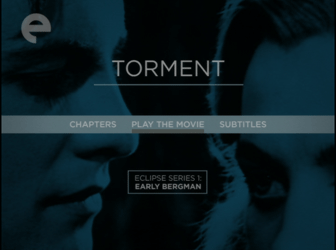
The Eclipse series is a new offshoot of the Criterion collection designed to showcase lesser-known works by great directors in a moderately priced, no-nonsense package. For filmmakers with a large catalogue, giving each and every one of their movies the full treatment with bonus discs overflowing with extras and commentaries will take forever, so Eclipse will rescue films from further down a given director's roster, skipping over the cursory supplemental materials.
Early Bergman is the first set of movies in this series, and it brings together five pictures by legendary Swedish director Ingmar Bergman from before the career upswing that began with 1955's Smiles of a Summer Night. In many ways, Bergman is the quintessential art house director. The stunning original images he created for one of his most iconic films, The Seventh Seal, are the first parodists and detractors turn to when they want to do a send-up of foreign films. If the level of satire pointed at an artist is a measure of that artist's success, then Ingmar Bergman is up there with Edvard Munch and his painting The Scream as the pinnacle of that kind of flattery. Having stood behind the camera for sixty-six movies, including his most recent masterpiece, Saraband (2003), I think Bergman can handle the scrutiny.
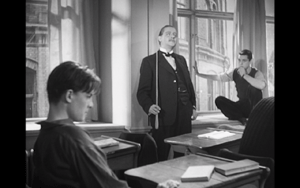
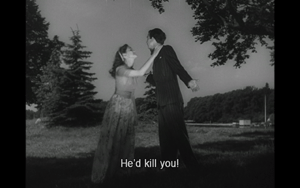
left to right: Torment; Crisis
* Torment (Hets) (101 minutes - 1944): The only film in Early Bergman that Ingmar did not direct, Torment initiated his transition from the world of stage plays to the movie theatre. Bergman wrote the screenplay for Torment and served as Alf Sjöberg's assistant director, including lensing reshoots on the final scenes when the more seasoned director was unavailable. Though this was merely the beginning of Bergman's illustrious career, many of his thematic hallmarks are already on display.
Set in a Swedish boarding school, Torment concerns itself with the plight of a sensitive senior, Widgren (Alf Kjellin). Like most of his fellow students, Widgren can't stand the enforced requirements of an academic career, but his education takes a turn for the worst when the affectionately nicknamed Caligula (Stig Järrel), the school's most hated teacher, makes harassing Widgren his personal project. The boy finds some solace in Bertha (Mai Zetterling), an attractive girl who works at the tobacconist, but another man is stalking her. His dark shadow grows larger and larger until it obscures all the joy in their romantic rendezvous. As his two problems converge, Widgren is faced with having to solve both of them before he can graduate into adult life.
Torment is a coming of age story with overtones of a psychological thriller. Though it never evolves into a cat-and-mouse game or even involve things that go bump in the night, Sjöberg films Bertha's misguided admirer using gothic lighting. Shadows stretch up staircases and threatening hands reach out of the darkness to snatch Bertha by the back of the neck, the way the stalker will later dangle her kitten in front of her. Yet, this isn't a fatal attraction scenario. No punches are thrown, no knives are raised; rather, Widgren is caught up in a Bergman drama, and the young filmmaker's eye is already trained on the oppressiveness of institutions and man's inhumanity to man. More than he needs to learn Latin, Widgren needs to learn to not let these outside forces bog him down. At times, Torment moves a little slow, but its portrait of sadism is still powerful. The nightmares experienced both when awake and asleep are harrowing (Caligula has a particularly nasty speech about the only time he ever feared death), and Widgren's personal triumph manages to shine as a result.
Picture/Sound: The monaural sound mix is pretty good, avoiding any hiss or other drawbacks you often find in older films. As with all the films in the Early Bergman set, Torment is presented in its original Swedish language, and the new English subtitles are nicely written and pass at an easy-to-read speed. On the other hand, the image quality is real up and down. Though mainly crisp with nice tonal values, the fullscreen picture (1.33:1) is far from perfect. There is quite a bit of flickering and surface debris in many scenes.
* Crisis (Kris) (93 min. - 1946): Bergman's full directorial debut kept a tentative foot back in the theatre world, as he adapted a play by Leck Fisher. The titular crisis doesn't refer to any physical threat or dangerous situation, though there is at least one character poised on a mortal precipice that he may never return from; rather, any crisis faced in this story is one of the soul. The film is a morality tale, and the circumstances of the narrative forces all the people involved to question the choices they have made and where they are in their ethical lives.
Nelly (Inga Landgré) has grown up in a small town under the care of Ingeborg (Dagny Lind), a poor music teacher who took the girl in when her mother abandoned her. Eighteen years later, Jenny, the mother (Marianne Löfgren), has returned to take her child back to the big city with her. Nelly has been dreaming of a more inspired life. The rural existence bores her, and she isn't interested in the kindly veterinarian (Allan Bohlin) who wants to marry her. She's more intrigued by Jack (Stig Olin), the gregarious imp that follows behind Jenny. He's dangerous and flashy, and Nelly can't help but accompany him and her mother on their return to Stockholm.
It's easy to divine where the sympathies of the film lie. The provincial narration feels at home in the little village, and it disappears once everyone is in the city. The division in Nelly's allegiance isn't the only crisis that must be confronted; her choices also force Ingeborg to question where she stands as a woman of faith and Jenny to wonder if her material pursuits have served her well. Even the devil-may-care Jack turns out to have things that trouble him. He is perhaps the most divided character in the whole story, and so he pays the ultimate price. Bergman's translation of the play skirts dangerously close to the edges of the potboiler genre, but it always maintains his characteristic stoic composure. Only the film's score betrays the inner passions of the characters, the orchestra swelling like the lust that burns in their breasts. It's a very traditional soundtrack, and the young director seems to struggle a little with the old conventions of movie making. His choices aren't always surefooted and sometimes come off as too mannered. At the same time, he also shows an inventive visual eye, using dissolves and double-exposures to excellent effect, especially in Ingeborg's nightmare and Jenny's discovery of Jack and Nelly's indiscretion.
Picture/Sound: Crisis has a more consistent picture than Torment. There is much flickering in the early scenes, but that soon passes, and there is very little by way of scratches or spots. The mono soundtrack isn't as clean, however. A background hiss appears at regular intervals throughout the movie.
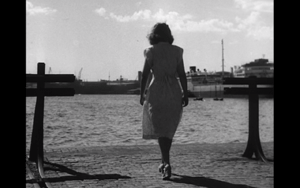
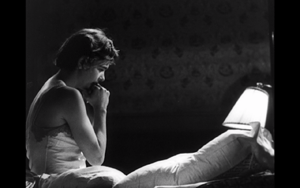
Port of Call; Thirst
* Port of Call (Hamnstad) (97 min. - 1948): At the start of Port of Call, one person is coming into the harbor, and one person is going out. Gösta (Bengt Eklund) arrives from the East Indies by boat, while Berit (Nine-Christine Jönsson) tries to leave by jumping off the dock and into the ocean. Gösta isn't the one who leaps in after her, but when he runs into her again at a dance hall, he strikes up a relationship with her, a decision that may end up making him her knight in shining armor by default. Berit has had a rough life. Strife at home led to a misspent youth, which led to her being sent to a girl's reformatory and putting her in the sort of endless cycle of turmoil such systems perpetuate. It's hard for her to get close to anyone because she is scared her past will cause them to push her away, a catch-22 Port of Call will try to solve.
For his fifth feature, Bergman breaks out of the confines of city and town life and goes outside, shooting on location at an actual working shipyard. The use of a real backdrop sets the stage for a more realistic script, sexually frank and unflinching in its depiction of a hard-hearted world. If Gösta at first seems like a two-dimensional character, it's only because he lives without feeling. He can fight for a girl, sure, and even tell her he loves her, but it's not until Berit tests the levels of his commitment that he also has to test himself. His emotional explosion is intense, but his switch from blunt instrument to sensitive soul is convincing. At one point, Bergman has Eklund look straight into the camera as if he is addressing the audience as much as he is talking to the hooker in the room with him, and the effect is chilling.
In some ways, Port of Call is almost like the B-side to Torment. In the earlier film, we see the effects of an abusive educational system on a young man; here, it's the consequences of a revolving door penal system. In that sense, Port of Call is ahead of its time, noting that most houses of reform are really just brutal breeding grounds for future problems. Bergman draws a remarkably nuanced performance out of Nine-Christine Jönsson. As Berit, she is troubled and neurotic, but she also has flashes of defiance and real tenderness. It's an early hint of his affinity for working with actresses, which would later result in some of his best-known films.
Picture/Sound: In another reversal, the 1.33:1 image transfer of Port of Call is free of the flickering seen on the first two DVDs, but it does have some scratches on the print. Most of the clean-up is rather nice, however. The footage shot on location has an effectively gritty look to it, lending it an air of documentary footage. The sound, on the other hand, is nice and clear with no excess surface noise.
* Thirst (Törst) (84 min. - 1949): Thirst is the only picture in the set not to be written by Ingmar Bergman, and while the final product grasps for a certain storytelling sophistication, it doesn't quite get a hold of it. Written by Herbert Grevenius, who collaborated with Bergman on several other films, and adapted from short stories by actress Birgit Tengroth, the structure of the story is an attempt to mirror the tangled relationships of its characters, but not every knot comes off as if it were tied with the same rope.
The bulk of the story features a troubled couple, Ruth (Eva Henning) and Bertil (Birger Malmsten), as they return to Stockholm after a visit to Italy. The Europe they are touring has been blasted by war, its scarred landscape analogous of the emotional ruin the pair finds itself in, the hunger of the starving peasants akin to the couple's need for love. Ruth takes center stage from the get-go. Plagued by insomnia and alcoholism, her mind drifts to remembrances of her love affair with Raoul (Bengt Eklund), a cad who kept her as his mistress until she became pregnant and then cast her aside on the slimmest of pretences. A botched abortion has now rendered her sterile and created health problems that have ruined her dancing career. Eva Henning is the best thing about Thirst. She imbues Ruth with a manic energy, jumping from pole to pole in the space of a sentence or two. One line she's up, the next line she's down. Switching between her past and present lends Thirst an almost noirish feel. Like a hardboiled hero, she's trying to outrun a past that is always going to be with her. She even narrates her own agony.
When we stay with Ruth and Bertil, the movie works. Bergman would return to exploring toxic marriages time and again through his long filmography, and the way these two are slowly killing each other with their verbal poison is just as potent as any of the director's later masterpieces. It's when Bergman leaves them for a side story that things start to break down. Bertil has a romantic failure in his past, as well. He was involved with a widow named Viola (Tengroth), whose physical illness seems little more than a way to mask her greater problems. There are incisive parallels to be drawn between Bertil's two lovers, showing his tendency to fall in love with damaged women; however, instead of weaving his past into the main story the way they did with Ruth's flashbacks, Bergman and his writers instead decide to show Viola's present. In three long segments, they show Viola abandoned to her own out-of-control depression, victimized by her doctor (Hasse Ekman), and preyed upon by an opportunistic lesbian, Valborg (Mimmi Nelson), who just so happens to be a friend of Ruth's. Not only is the coincidence a little too easy, but Viola's story stands too much on its own to feel like an integrated part of Thirst's narrative. Viola's first appearance shows up so deep in the story, it's too late to shift gears.
The ending of the movie also comes off as a cop-out. An important sequence is revealed to be a dream almost as an afterthought, like someone came in after Thirst had been cut and insisted they polish up the ending so as not to bring the audience down. The noir is whitewashed right out of it.
Picture/Sound: Of all the films so far, Thirst gets the best transfer, both in picture and in sound. I didn't notice any egregious problems with either, and though not as glossy as it could be, it's certainly above average for a film of this age.
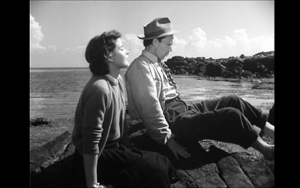
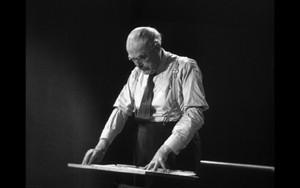
To Joy
* To Joy (Till glädje) (99 min. - 1949): It's fitting that the Early Bergman boxed set would be capped with To Joy, because of the five films here, this is the one where Ingmar got everything right. It opens with a concert violinist being pulled from rehearsal to be told that his wife and daughter have died in a freak accident. Overcome by grief, he ponders over the seven years they had together. Beginning when he was a young and socially awkward loser who had to be pushed to see the love staring him in the face, through marriage and children, his professional failure and cold-hearted infidelity, and full circle to him discovering love all over again right where it had always been, the flight of memory ends as fate deals the man the rotten cards the opening scenes showed us. The deaths are a foregone conclusion that hangs over the film, and what will be done once they come is the big question mark. Bergman's script is passionate, romantic, and unflinchingly honest about the foibles of the scenario's lead figure, Stig, played by one of the director's regular collaborators, Stig Olin. The violinist's priggish obstinacy is smoothed over by the tender grace of his wife, Marta, depicted with warmth and beauty by the lovely Maj-Britt Nilsson. She stands strong, and it's with that strength that she pulls Stig back from the brink.
When you consider that Bergman had recently gone through his second divorce, To Joy reveals itself to be painfully close to real life. His portrayal of Stig is almost like an act of self-immolation, the director laying his own difficult artistic temperament on the table to be dissected. Stig consistently acts selfishly. His failure as both a musician and as a husband can be related directly to his inability to give completely of himself, to ever be so lost in a moment as to not be thinking about how it might advance his image as a genius. In a bitter bedroom scene where his affair is brought to light and Marta begins to cry, he tells her to cut it out, there is no one else to hear her sobs. He has no concept that anyone could genuinely feel, it must all be for show. If Stig ever wants to have anything good in his life again, he's going to have to learn otherwise.
Any sense of tentativeness in Bergman's direction is gone by To Joy. He understands every move he needs to make in the film, from the heavy moments where Stig's ugliness really comes to bear all the way to the playful moments, slipping on different narrative voiceovers or showing the affection and humor that allows Stig and Marta to stay together. It's a direct precursor to the couple that featured in Scenes from a Marriage and Saraband decades later. This is also an early instance of Bergman taking us backstage, showing us the secret lives of performers, which would show up again in films as far apart in years as Smiles of a Summer Night and Fanny & Alexander. Even Stig's artistic mentor, the old conductor Sönderby is a hint of things to come, as the role is filled by Victor Sjöjström, Bergman's own real-life mentor and the star of one of his best films, Wild Strawberries. Perhaps it was the personal nature of the script, or maybe it was just down to having eight features under his belt, but when Bergman called a wrap on To Joy, he had a truly great motion picture in the can.
Picture/Sound: To Joy is nearly on par with Thirst as far the quality of the DVD. It has a few more snaps, crackles, and pops than that disc, but it's a well-scrubbed fullscreen presentation nonetheless. The soundtrack has also been mixed really well, which is essential to this film given the many orchestral performances that track the misfortunes of the protagonist.
***
Though these five movies lack the formalism and assured direction that would eventually make Ingmar Bergman one of cinema's most distinctive directors, his main thematic interests are already starting to emerge in Early Bergman. Throughout his career, he has always been fascinated by what drives people together and tears them apart. Be it the interpersonal relationships of women or the special dynamics of marriage, a Bergman film is almost like a game of Jenga where the building blocks are human interactions. By removing one element at a time, he finds what pieces really matter, what aspects of each personality allows their relationships to stand and which ones create the inevitable downfall. Amidst this turmoil, his characters step up to some line, are forced to confront issues of faith and identity, and test their strength. Sometimes they end up okay, sometimes it all goes to hell, but the movies almost always ring utterly true.
If the styles of the films given here seem hesitant or all over the place, it's only because we are seeing an artist change his career focus from one medium to another, learning a new craft and trying to find his personal voice. That's the fun with a collection like Eclipse's Early Bergman: by putting these films together, it allows the viewer a greater understanding of how an artistic vision can come into focus.
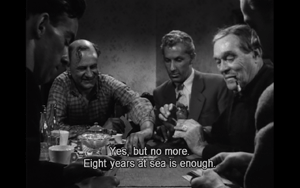
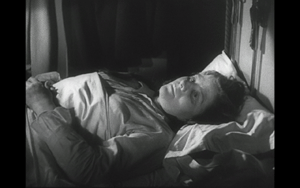
Port of Call; Crisis
THE DVD
Video/Sound:
Please see descriptions of each disc's technical aspects in the individual reviews above.
Extras:
As noted in the main review, the Eclipse series is intended as a no-frills alternative, so there are no bonus features on any of the DVDs. The 5 movies come housed in individual slimline cases that fit inside a cardboard slipcover. They can be slid out of the top or the bottom of the cover rather than the side. By way of supplemental material, each case has a short, informative essay about the film's importance to Bergman's career printed on the inside front cover.
FINAL THOUGHTS:
Highly Recommended. The debut release from Criterion's new Eclipse series, Early Bergman is the portrait of a filmmaker in development. Using five movies spread over five years, the playwright and theatre director went from stage to screen, beginning as a screenwriter and easing straight away into captaining his own features. Trying on a number of genre trappings and experimenting with the language of film, Ingmar Bergman created his own style of interpersonal dramas, tracking the conflicts of conscience and the struggles of individuals against larger institutions--be they physical (school, bureaucracy), personal (marriage), or grand (religion, life itself). Some of elements work better than others, but by the fifth movie, the auteur emerges, and the journey from baby steps to running a real marathon is an education for film fans that also manages to be involving, thought provoking, and entertaining. As an experiment in presenting a moderately priced (about $16 a movie at full retail) package of films minus the bells and whistles, I deem it a success. Not every film in history needs to be combed over and celebrated with documentaries, commentaries, and other bells and whistles. Eclipse and Early Bergman are all about the movies, and that's just all right with me. It doesn't always have to be bigger, brighter, faster, more...you know?
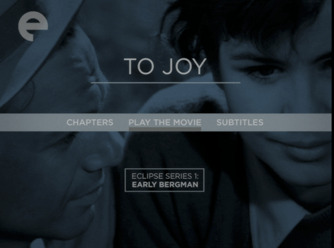
Jamie S. Rich is a novelist and comic book writer. He is best known for his collaborations with Joelle Jones, including the hardboiled crime comic book You Have Killed Me, the challenging romance 12 Reasons Why I Love Her, and the 2007 prose novel Have You Seen the Horizon Lately?, for which Jones did the cover. All three were published by Oni Press. His most recent projects include the futuristic romance A Boy and a Girl with Natalie Nourigat; Archer Coe and the Thousand Natural Shocks, a loopy crime tale drawn by Dan Christensen; and the horror miniseries Madame Frankenstein, a collaboration with Megan Levens. Follow Rich's blog at Confessions123.com.
|
| Popular Reviews |
| Sponsored Links |
|
|
| Sponsored Links |
|
|
| Release List | Reviews | Shop | Newsletter | Forum | DVD Giveaways | Blu-Ray | Advertise |
|
Copyright 2024 DVDTalk.com All Rights Reserved. Legal Info, Privacy Policy, Terms of Use,
Manage Preferences,
Your Privacy Choices | |||||||














